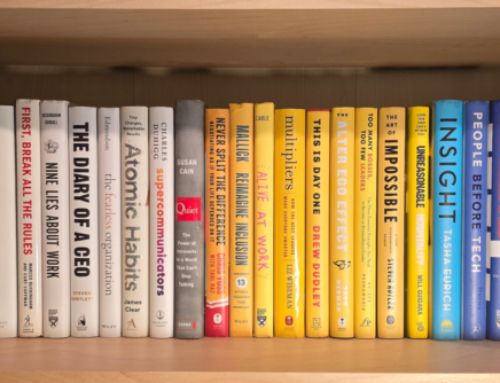Open-ended Questions For Coaches
(BONUS: Download Your Cheat Sheet)
You likely heard the expression, “If at first you don’t succeed, try, try again.”
Or, my dad’s version, “If all else fails, Phil, read the instructions!”
The idea behind these phrases is that you don’t give up when you fail at something.
You pause.
You regroup.
Then, you think about what you could do differently next time to give yourself a better chance of success.
But, Before You Try
Before you continue doing the same thing over—when you “try” this time—perhaps a different perspective (a coach) would help you see where you failed the first time or someone who can show you the instructions for getting it right the next time.
I failed miserably the very time I went for my first promotional interview.
It took place in a room containing three stern-looking faces, and I dared to think that because I had been proving myself as a police officer, these faces would approve my jump to the rank of supervisor.
Boy, was I wrong!
Following the promotional competition’s results, I was offered a feedback interview with one of the panel members. I readily accepted. I wanted to learn how to do better next time.
Unfortunately, the feedback was similar: “If at first you don’t succeed, try, try again.” I had hoped for guidance on HOW to do better next time.
The Super Power of Open-Ended Questions
Fortunately, while I was lamenting my circumstances to Scott, a friend of mine, he generously shared the power of power of asking and answering open-ended questions.
As the leader, you can greatly favor your team by asking open-ended questions during one-on-one coaching (or in any situation).
Great coaches don’t just give answers. They ask the right questions.
Open-ended questions are not just any questions but powerful inquiries that unlock potential and inspire action. A great question creates clarity.
Well-crafted questions are the backbone of amazing coaching conversations. In my case, they became the instructions my dad wanted me to read before trying again.
“One who never asks either knows everything or nothing.”
Malcolm Forbes
Nuts and Bolts
So, what makes a question genuinely effective?
To answer that, let me share the types of open-ended questions that are game-changers in coaching conversations.
Clarifying Questions – designed to cut through the noise.
They get to the heart of the matter, helping people sift through complexity and focus on what’s most important.
Examples include:
“What’s the real issue here?”
“What outcome are you truly seeking?”
These questions are essential for maintaining focus and ensuring the conversation is productive. They help people avoid getting lost in the weeds or going off course and stay aligned with their goals and on track.
Exploratory Questions – designed to help you dig deeper.
Their purpose is to peel back the layers of a situation. They prompt people to think critically and examine their assumptions. For example:
“What’s the underlying challenge here?”
“How does this situation align with your values?”
These questions help people uncover the root cause of issues rather than just addressing symptoms. They encourage introspection, leading to deeper insights and more thoughtful decision-making.
Visionary Questions – designed to help you imagine the future.
Encourage team members to look beyond the present and imagine the possibilities.
They’re essential for strategic thinking and long-term planning. Examples include:
“What does success look like for you in this scenario?”
“If you could wave a magic wand, what would you change?”
Visionary questions encourage people to break free from limitations and envision a future where they can achieve their fullest potential.
Reflective Questions – designed to learn from experience.
They are all about looking back to move forward. They help people learn from past experiences and apply those lessons to current challenges. (If only I had known this earlier in my career! )
Consider questions like:
“What did you learn from that experience?”
“How could you approach this differently based on your learning?”
These questions foster a growth mindset, help turn setbacks into stepping stones, and encourage continuous improvement. (I have every confidence my readers do this weekly!)
Action-Oriented Questions – designed to help people move forward.
The preceding questions lead to the next step—action. It’s time to turn intentions into actions using tangible and accountable steps.
Examples include:
“What’s the first step you’ll take?”
“Who can support you in this action?”
These questions are crucial for bridging the gap between thinking and doing. They ensure that the conversation leads to tangible, measurable progress.
Empowering Questions designed to build confidence.
Empowering questions are designed to bolster a person’s confidence and autonomy. They shift the focus from problems to solutions and from obstacles to opportunities. For instance:
“What strengths can you leverage in this situation?”
“What resources do you have at your disposal?”
Empowering questions are powerful because they remind people of their capabilities. They transform doubt into determination, enabling people to tackle challenges with renewed purpose.
Carol Dweck discusses this very thing throughout her seminal book Mindset.
The Superpower of Coaching
Effective coaching conversations with people are not about having all the answers. They are about asking the right questions that challenge, inspire, and empower. Open-ended questions lead to breakthroughs and transformations.
When you coach people, your ability to ask these types of questions is what sets you apart.
It’s what turns a good coach into a superhero.
So, the next time you’re in a coaching session, think about the questions you’re asking.
Are they transformative?
And are they driving the other person towards their best future self?
Oh, and by the way, you can use these on yourself, too!
“Part of being successful is asking questions and listening to the answers.”
Anne Burrell
One of my favorite coaching questions comes from the amazing mind of Canadian coach Dan Sulivan, who asks:
“If we were having this discussion three years from today, and you were looking back over those three years, what has to have happened in your life, both personally and professionally, for you to feel happy with your progress?”
Now, that’s a powerful question that’s worth thinking about!
**********************
Thank you for being here each week – whether you read or listen.
I never take for granted the time you take to open, read, or listen to me here.
If you know anyone else who would benefit from receiving this information each week, please suggest they sign up.
I look forward to sharing next week’s Living Leadership newsletter with you.






